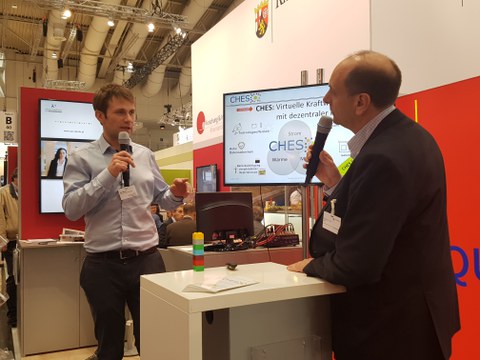Apr 26, 2019
CHES at the Hannover Fair: TU Dresden enables implementation of energy system transition in residential area

Jens Werner presents CHES at the Hannover Fair 2019
Is the energy transition still feasible? From a technical point of view, it could already be feasible by 2030. However, political and economic hurdles will make the energy system transformation a long way off in the coming years. The goal of the energy revolution in Germany is to increase the share of renewable energies in electricity consumption to 80 % by 2050. The CHES research team at the TU Dresden, headed by Jens Werner (Faculty of Electrical Engineering and Information Technology, Chair of Electrical Energy Supply), which has been conducting research in the field of combined electricity, heat and mobility for more than six years, presented its CHES research project for the first time at the Hannover Fair in April 2019. CHES realizes a novel system architecture based on decentralized intelligence for virtual power plants and wants to contribute to a successful energy turnaround. The innovative system enables the control and marketing of energy systems, e.g. heat pumps, fuel cells and battery storage systems, and guarantees an economical, highly flexible and stable supply system. At the end of this year the team of 4 would like to spin off.
TUD: How does CHES make the energy turnaround for the residential quarter possible?
The energy turnaround can only succeed if small energy systems, such as heat pumps, fuel cells and electric vehicles, participate in the control of the energy balance in the electrical grid. This is only possible if these systems can be economically integrated into a virtual power plant. So far it has not been possible. CHES' technical solution using decentralised intelligence enables energy trading or balancing in residential areas.
TUD: In April you were at the Hannover Fair to present CHES. Was this your first trade fair appearance?
Yes, that was our first appearance in this research group. We only started our project last July, even though we have been working together for eight years. We were at the HMI with a research project about three years ago, but not with CHES. As an existing research transfer project, CHES, this was actually our first trade fair appearance at the joint stand of the TU Dresden. The focus was clearly on company foundation and customer, partner and investor acquisition.
TUD: What are your impressions of the Hannover Fair?
On the whole very positive. We had over 100 discussions, 35 of which we are still evaluating. It is very interesting to get into conversation with other exhibitors and visitors and to talk shop about the energy revolution and exchange opinions in order to get informed about current developments. You get a very comprehensive picture because the visitors and exhibitors are very different; from students to large corporations to interested senior citizens, everything is there.
TUD: How exactly did your trade fair appearance look like?
In addition to our exhibitor activities, we held many discussions and gave a total of three presentations at various forums, including Digital Energy and Young Tech Enterprises. In addition, we built a demonstrator to better visualize our 8-year research work and to get in touch with visitors more quickly. It is important to be able to illustrate your work with an eye-catcher in order to attract visitors and potential future partners to the stand.
TUD: What experiences do you gain from your presence at the trade fair?
The numerous discussions and the resulting contacts were particularly positive, as was the comprehensive picture of current results in the various research areas. Unfortunately, the location was not quite ideal in our case, as we were standing in the research hall. On the one hand, this is good because there is a lot of public traffic here, on the other hand we were very far away from the halls of energy technology, our special field. But the stand organisation at the TU Dresden was very good, we are very satisfied with the preparation, support and implementation. The interest of politicians was also very positive, both the Minister of State for Science and the Arts, Dr. Eva-Maria Stange, and the Minister of State for Economics, Labour and Transport, Mr. Martin Dulig, visited the joint stand of the TU Dresden and took the time to talk to the scientists. We felt that this was a great appreciation of our research work.
TUD: Do you also want to participate as an exhibitor at trade fairs in the future?
There are definitely more trade fair appearances planned in the energy sector. Next year we definitely want to go to E-world in Essen. Unfortunately, this is not currently offered via the TU Dresden, but if there are enough interested parties, participation would may be possible. A trade fair appearance always offers a great opportunity for research groups to network and make interesting contacts.
The interview was conducted by Natascha Postel from the Transfer Office of the TU Dresden with Irina Weis and Tobias Heß from the CHES research group.
Information for journalists:
Irina Weis Project collaborator "Combined Hybrid Energy Systems" Phone: +49 351 463 40764
